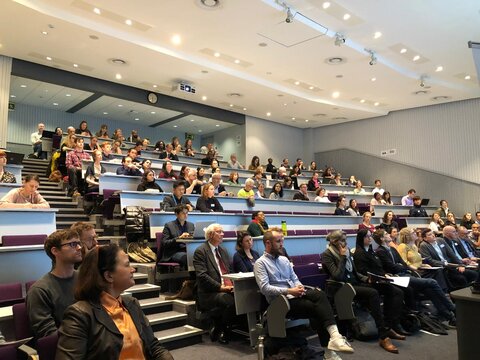London NTD research communities celebrate World NTD Day and anniversary of the LCNTDR

On 30 January 2020, more than 145 people convened at the Royal Veterinary College to celebrate the inaugural World NTD Day and anniversary of the London Centre for Neglected Tropical Disease Research and the London Declaration on NTDs.
The event featured a keynote address from the newly-appointed Chair of the All Party Parliamentary Group for Malaria and NTDs, Catherine West MP, who praised the efforts of all stakeholders working towards the control, elimination and eradication of NTDs. Ms West highlighted the progress made in the last decade, including 31 countries receiving validation by the World Health Organization for eliminating at least one NTD. Ms West also paid tribute to her predecessor Jeremy LeFroy MP, who chaired the APPG on Malaria and NTDs from 2010 to 2019, and noted the cross-party support for work on NTD control.
Fifteen LCNTDR researchers presented new work across 10 NTDs, including Buruli ulcer, Chagas disease, onchocerciasis, leishmaniasis, leprosy, lymphatic filariasis, schistosomiasis, soil-transmitted helminths, trachoma and yaws.
Speaking at the event, LCNTDR Director Professor Sir Roy Anderson emphasised the importance of new collaborative research to achieve the NTD targets expected in the new WHO 2021-2030 NTD Roadmap, which will be launched at the Kigali Summit on Malaria and NTDs in June 2020.
Presentations included:
- Accelerating trachoma elimination through ‘Stronger-SAFE’ – Dr Ailie Robinson, London School of Hygiene & Tropical Medicine
- Schistosomiasis: assessing progress towards the 2020 and 2025 goals - Dr Arminder Deol, London School of Hygiene Tropical Medicine
- Morbidity control in schistosomiasis hotspots: an introduction to the FibroScHot trial protocol - Dr Shona Wilson, University of Cambridge/Royal Veterinary College
- Validation of a recombinase polymerase amplification assay for the diagnosis of female genital schistosomiasis in Zambian women using cervicovaginal lavage and vaginal self-swab samples - John Archer, Natural History Museum
- Patterns of individual non-treatment during multiple rounds of community-wide mass drug administration for control of soil-transmitted helminths in the TUMIKIA trial, Kenya - Dr William Oswald, London School of Hygiene & Tropical Medicine
- Achieving and sustaining elimination of schistosomiasis and soil-transmitted helminths: the Geshiyaro Project - Dr Anna Phillips, Imperial College London
- The Skin Health Africa Research Programme (SHARP) - Dr Steve Walker, London School of Hygiene & Tropical Medicine
- Progress in mental health and NTDs - Dr Julian Eaton, CBM / London School of Hygiene Tropical Medicine
- Micro-CT visualisation of the parasite-host interface in sandflies and blackflies - Dr Martin Hall, Natural History Museum
- Towards the 2030 goals for Chagas disease: incidence and prevalence trends for 15 Latin American countries - Dr Zulma M. Cucunubá, Imperial College London
- Estimating the economic impact of schistosomiasis in ruminants in Senegal - Dr Barbara Haesler, Royal Veterinary College
- Elimination of onchocerciasis: the case for Moxidectin - Dr Jon Hamley, Imperial College London
- Defining a prevalence level to describe the elimination of lymphatic filariasis transmission - Dr Ben Collyer, Imperial College London
- Modelling the impact of a Schistosoma mansoni vaccine and mass drug administration to achieve morbidity control and transmission elimination - Dr Klodeta Kura, Imperial College London
- The risk of severe adverse events associated with ivermectin distribution in areas co-endemic for onchocerciasis and loiasis: a mathematical modelling study using EPILOA - Charlie Whittaker, Imperial College London